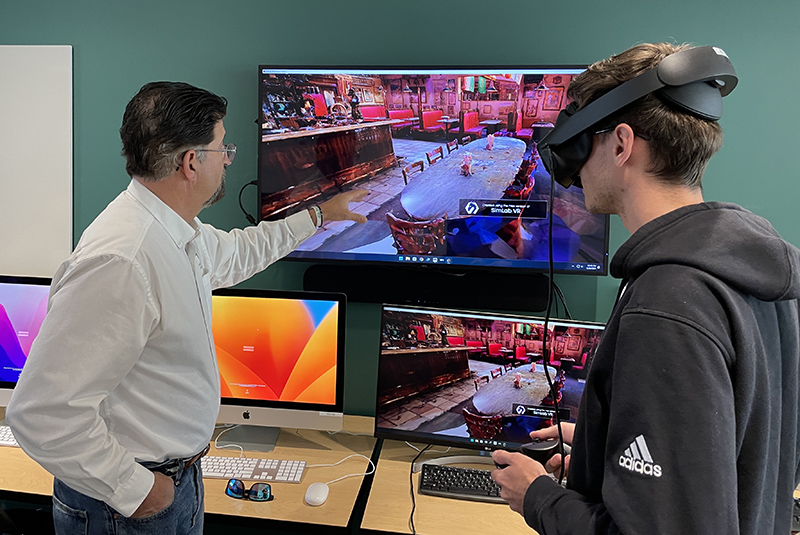
How Husson's Instructors Prepare You for a Career in XR
Published on: November 15, 2023

In this blog, we've already discussed a great deal about extended reality (XR) and how Husson University is a leader in preparing students to work in this fast-growing technology field. Indeed, we've dug into exactly what XR is, examined some of the technology and opportunities at Husson's iEX Center, observed how Husson's XR program partners with international businesses for special projects, and even heard a Husson student's perspective on the program.
We haven't, though, gone too far into detail on what goes into making XR experiences, or more importantly, what you'll need to succeed as an XR professional. It requires an understanding of both the technology that powers XR, as well as guidance from experienced XR professionals and teachers. Read on to discover how Husson assists you on both fronts.
The Framework of XR
While XR experiences represent the usage of cutting-edge technology, the actual engines powering most XR have been around for quite a while. Since developers began working to create extended reality environments that combine immersive digital experiences with the real world, they primarily made use of the Unreal and Unity engines. Both have been around for decades and both are primarily used to create 3-D environments for video games.
It's that ability to make realistic and immersive environments that makes these engines perfect for XR experiences. However, it's these engines' origins in the world of video games that have allowed them to open paths for careers in XR. Many students first develop an interest in the possibilities of interactive virtual worlds through video games, and some even begin to experiment with coding and development by creating unique mods for those games. Later, if these same gamers develop an interest in XR, they have a leg up from their experience working with Unreal and Unity.
Getting Real Professional Experience
Of course, preparing for a career in XR requires more than just knowledge of working with the proper engines. It also requires a variety of skills that can only come from collaborating with other XR experts on real projects. Though those skills are best perfected on the job, you can begin developing them while still in school, especially when you have a trained and experienced XR professional to help guide your studies and learning.
You need someone like Tharun Thiyagarajan, BCA, MBA, an instructor in Husson's School of Technology and Innovation.
Thiyagarajan is an "expert in game engines," according to Brave Williams, Director, iEX Center and Associate Professor. Chosen for his new role at Husson from a group of about 85 candidates worldwide, Thiyagarajan brings an enormous amount of professional experience to Husson.
Thiyagarajan sees his role at Husson as a hybrid one, split between working with students and the technology in the iEX Center. “I can teach and I can also develop,” Thiyagarajan explains. “I can also make students part of our development.”
That desire to bring students in to his development projects is an essential part of the impact that Tharun brings to Husson. Having worked in a wide variety of XR related projects over his career, Thiyagarajan has a strong sense of how to bring people into projects and put their talents and interests to work for the benefit of the project itself while also ensuring that the students are able to better develop their skills.
Creating Project Cheers
For example, Thiyagarajan is currently working on Husson’s Project Cheers. This project is focused on creating virtual simulations of Bangor, Maine area restaurants and hotels. This will assist in the training and education of students in Husson's Hospitality and Tourism Management Program and could have applications beyond Husson to help educate hospitality students nationwide and train restaurant and hotel industry professionals.
“We’ve been working to create a digital twin of a restaurant. I’m using point cloud data to create that virtual experience using Oculus Quest,” he explains. “I’ve pulled some students from my 3D modeling classes, and they are helping me with mesh cleanups, creating models and textures, and other tasks. Some people are really good with research, and they’ve been finding lots of good solutions on how to convert this point cloud data into a proper working mesh using Vectorworks and other software. And other student is really good with lighting, so I have him working on the lighting setup.”
This collaborative effort benefits both the students and contributes to the project’s overall success. Thiyagarajan explains: “I’m working on finding a solution, but it’s everyone’s effort and skill that has been used to put together this particular project. That means everyone is more invested in its success. And also, my students can showcase the skills they’ve developed when they go on to other projects or interview for a job. They already have this experience of following a particular project lifecycle and development cycle for this particular application.”
Prepare for Your XR Career at Husson
Thiyagarajan’s collaborative approach to teaching is just one of the many unique opportunities offered by Husson’s XR program. There’s no doubt that with the facilities and faculties available, you’ll emerge from this program with a strong sense of both the framework of XR and how to put your skills to work in this field.
Request more info or apply to Husson's XR program today. This is your chance to get to work in a cutting-edge field that will only continue to grow in impact and demand.
Back to All Articles